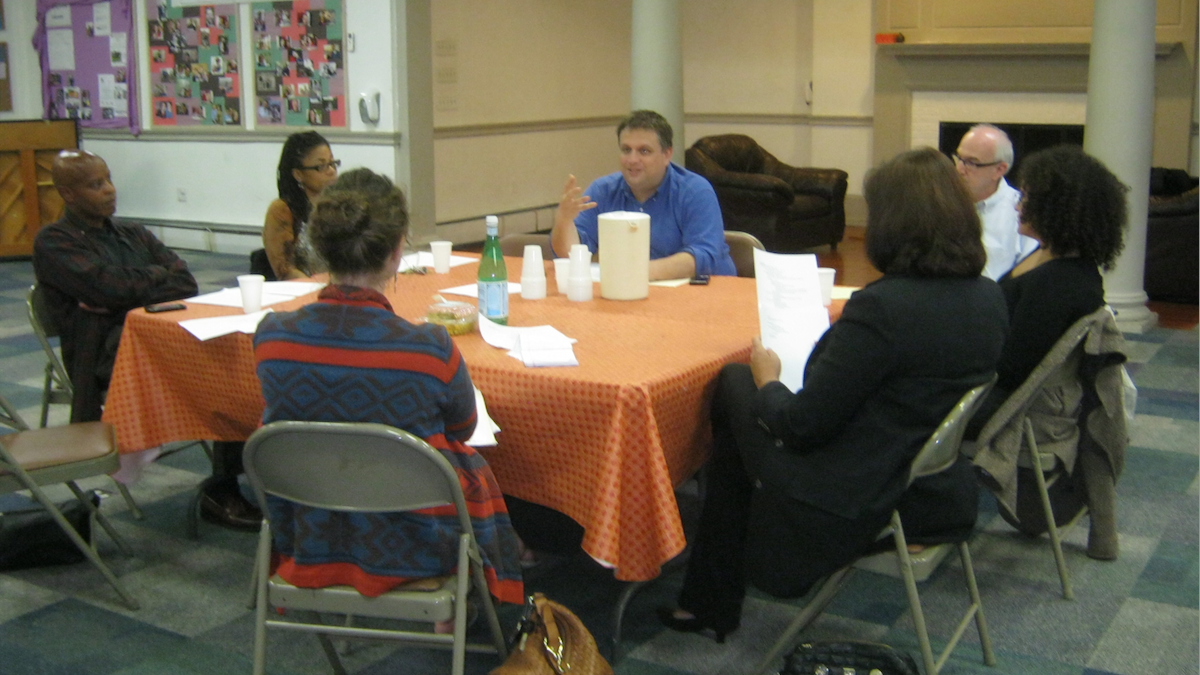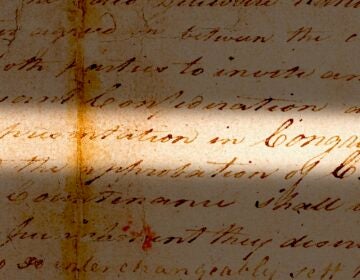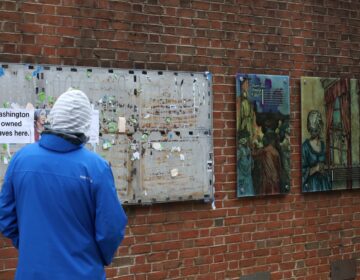Germantown Town Hall could host special events as early as Spring

Members of the Germantown Town Hall Collaborative hope to reopen the building for, at a minimum, temporary events in the Spring. (Alaina Mabaso/for NewsWorks)
Inspired by the Hidden City Festival’s June reopening of a neoclassic edifice on Germantown Avenue which had been abandoned for more than a decade, several enthusiastic locals have formed the Germantown Town Hall Collaborative.
Now, the group meets on the fourth Thursday of each month with the goal of re-activating the empty Town Hall building for public use.
Local architect Charlie McGloughlin, along with fellow group leader Amelia Carter, held the latest discussion on Thursday night at the Germantown Mennonite Church.
“Artists especially seemed to flock in there and use that space,” McGloughlin said of Town Hall, appreciating the way Hidden City had “cracked it open.”
“People just dug it,” McGloughlin continued. “It came back into community consciousness.”
Collaborative members decided to focus immediate attention on two relatively manageable goals: Raising the profile of the building itself and getting it open for a series of day-long special events throughout the year, instead of attempting any full-scale renovation or occupancy.
Taking measured steps
Initially, the group had hoped to launch an event at the site as early as October, but as McGloughlin put it, “cooler heads prevailed.”
The process of obtaining the necessary funding, inspections, staffing and permits for such events will be lengthy. As such, the next Town Hall opening is tentatively slated for Spring, provided the City of Philadelphia, which owns the building, grants all the necessary permissions.
Seven meeting attendees, including Andy Trackman — he’s the Germantown United CDC board president — discussed the complicated process of opening the building, even for a one-day event limited to the rotunda.
There are insurance and fire regulations to cover, architectural plans to submit and risk assessments to get, plus the necessity of mounting railings and sanitary facilities. Trackman confirmed that GUCDC, as the Collaborative’s fiscal sponsor, could play a role in meeting these costs.
Special guest
Lucy Strackhouse, director of the Fairmount Park Historic Preservation Trust, was invited to speak at the meeting as the Trust leases many city buildings to organizations throughout the region, including Allens Lane Art Center and the Valley Green Inn.
“I fell in love with that building two years ago,” Strackhouse said of passing Town Hall on her daily commute.
She said that the Trust could get involved with marketing Town Hall to potential buyers, but the Philadelphia Industrial Development Corporation would handle any resulting transaction.
According to Strackhouse, state subsidies will be needed to reopen the site for good. Fortunately, the building’s historic landmark status may help it qualify for federal and state historic-tax credits. Ultimately, she said she could envision a partial green roof or even a rooftop restaurant for the site.
She added that many local organizations have shown some interest in purchasing the site, including churches and caterers, the latter with an eye on hosting weddings or other events.
Ultimately, though, the space is a difficult fit for these functions, since no single room is large enough to hold a congregation or a banquet. It may one day see another life as a school, a mixed-use office/retail space, or artist studios, she said.
Financial questions
Carter pressed Strackhouse to give an estimate for the question on everyone’s mind: How much would it really cost to fully renovate the place?
Strackhouse replied that it’s impossible to answer since assessments vary widely as to the proposed use of the building, contractors involved and available funding. However, she vouched for the Town Hall’s sturdy condition, as a masonry building over a steel frame.
“That building has so little combustible material it’s amazing,” she added.
Exterior ideas
One of the evening’s most enthusiastic topics involved not opening the building itself, but using lights to bring new attention to the forgotten façade after dark.
“People will see it anew” and that will build buzz for the project, attendee L.T. Woody said of lighting the building with fixtures attached to an adjacent building’s roof.
Germantown artist Tere Stidem emphasized the importance of including the neighbors in any plans for the building, including nighttime lights, even if they wouldn’t be shining on adjacent residences. The group agreed that ongoing outreach will be crucial.
What now?
The group will move forward to determine the possible scope of next year’s Town Hall programming, and seek permits to temporarily occupy the space.
They hope that, in time, a series of small-scale individual events will result in momentum to resurrect the whole building.
“We’re creating a new cultural institution in Germantown,” Trackman said.
The Germantown Town Hall Collaborative’s next meeting will be held at 7 p.m. Thursday, Oct. 24, Germantown Mennonite Church, 21 West Washington Lane.
WHYY is your source for fact-based, in-depth journalism and information. As a nonprofit organization, we rely on financial support from readers like you. Please give today.




